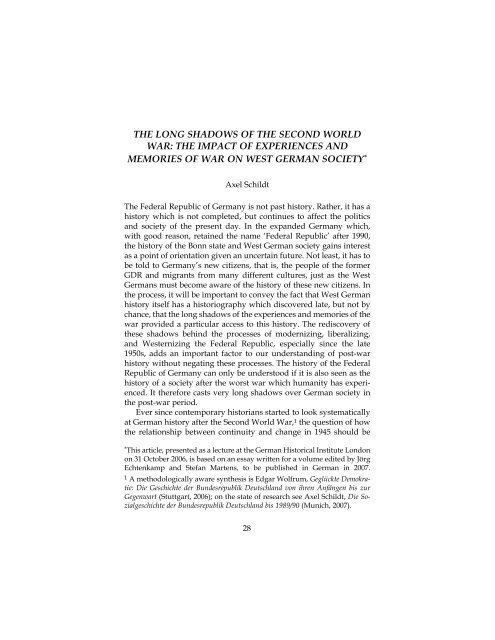Download - German Historical Institute London
Download - German Historical Institute London
Download - German Historical Institute London
You also want an ePaper? Increase the reach of your titles
YUMPU automatically turns print PDFs into web optimized ePapers that Google loves.
THE LONG SHADOWS OF THE SECOND WORLD<br />
WAR: THE IMPACT OF EXPERIENCES AND<br />
MEMORIES OF WAR ON WEST GERMAN SOCIETY *<br />
Axel Schildt<br />
The Federal Republic of <strong>German</strong>y is not past history. Rather, it has a<br />
history which is not completed, but continues to affect the politics<br />
and society of the present day. In the expanded <strong>German</strong>y which,<br />
with good reason, retained the name ‘Federal Republic’ after 1990,<br />
the history of the Bonn state and West <strong>German</strong> society gains interest<br />
as a point of orientation given an uncertain future. Not least, it has to<br />
be told to <strong>German</strong>y’s new citizens, that is, the people of the former<br />
GDR and migrants from many different cultures, just as the West<br />
<strong>German</strong>s must become aware of the history of these new citizens. In<br />
the process, it will be important to convey the fact that West <strong>German</strong><br />
history itself has a historiography which discovered late, but not by<br />
chance, that the long shadows of the experiences and memories of the<br />
war provided a particular access to this history. The rediscovery of<br />
these shadows behind the processes of modernizing, liberalizing,<br />
and Westernizing the Federal Republic, especially since the late<br />
1950s, adds an important factor to our understanding of post-war<br />
history without negating these processes. The history of the Federal<br />
Republic of <strong>German</strong>y can only be understood if it is also seen as the<br />
history of a society after the worst war which humanity has experienced.<br />
It therefore casts very long shadows over <strong>German</strong> society in<br />
the post-war period.<br />
Ever since contemporary historians started to look systematically<br />
at <strong>German</strong> history after the Second World War, 1 the question of how<br />
the relationship between continuity and change in 1945 should be<br />
* This article, presented as a lecture at the <strong>German</strong> <strong>Historical</strong> <strong>Institute</strong> <strong>London</strong><br />
on 31 October 2006, is based on an essay written for a volume edited by Jörg<br />
Echtenkamp and Stefan Martens, to be published in <strong>German</strong> in 2007.<br />
1 A methodologically aware synthesis is Edgar Wolfrum, Geglückte Demokratie:<br />
Die Geschichte der Bundesrepublik Deutschland von ihren Anfängen bis zur<br />
Gegenwart (Stuttgart, 2006); on the state of research see Axel Schildt, Die Sozialgeschichte<br />
der Bundesrepublik Deutschland bis 1989/90 (Munich, 2007).<br />
28













